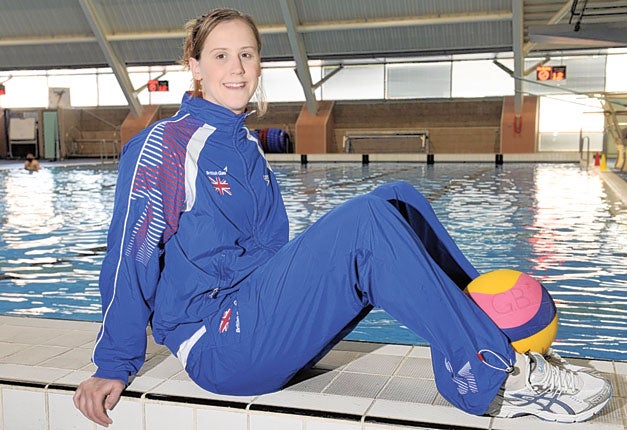Water polo: Underwater rugby ticks all the boxes
Winstanley-Smith leads the line as Team GB returns to water polo after more than half a century, writes Alan Hubbard

Missed out on the 100m final in the lottery for 2012 Olympic tickets? Are you among the million who haven't got anything at all, hoping you might get lucky in one of the less popular sports in the next phase of allocations? Like water polo? Now there's something few will be rushing to watch, you'd think.
Wrong. It's already a sell-out. Apparently what was thought to be the best-kept secret of the Games is out. Water polo is guaranteed to make a splash, not least because those fortunate enough to get tickets might witness better punch-ups than in the boxing finals. And that's only the women.
Fisticuffs are virtually guaranteed in a sport packed with high-octane excitement. Britain will compete for the first time in over half a century and seats at the 5,000-capacity venue alongside the Aquatic Centre have been snapped up.
Britain won gold medals in four of the first five Olympics between 1896 and 1920 but have not participated since 1956, the Games which featured the most violent encounter in Olympic history. The infamous match between Hungary and the USSR in Melbourne, which came four weeks after 20,000 Soviet troops had crushed the Hungarian uprising, saw the pool literally turn into a blood bath. The water ran red as fists flew between the two teams, the Hungarians urged on by hundreds of emigres in the crowd.
Any aquatic aggro in London is unlikely to scale those heights but you can be certain there will be a plethora of fisticuffs and some sly grip and grapple, much of it beneath the surface, the sin-binning and red-carding adding substantially to the scheduled 32 minutes of every game.
Angela Winstanley-Smith sounds as if she should be whacking the ball on an actual polo field but she is a key member of the British women's water polo squad who make their Olympic debut in London. She says: "The sin-bin is frequently in use. What goes on under water has to be seen to be believed – although, of course, you can't see it most of the time. In this respect I think women's water polo can be rougher than the men's."
"We describe it as rugby in water with a bit of wrestling thrown in. It has the physicality of rugby with the technique of handball. The ball can be at one end and two people are having a brawl at the other so the referees have to keep their eyes open. I have never known anyone who has come to watch and not enjoyed it."
She reached international level at swimming aged 15. "I got into water polo really by accident. I was at a swimming club in County Durham when the coach started a water polo team and pestered me until I joined."
Her uncle is former professional footballer Jim Mullen. "I played a bit of football myself and somehow the water polo coach put two and two together and thought I would be good at the sport. What appealed to me at the time was the interaction – being in a team. With swimming it's much more of a routine, you look at the clock and you've been doing the same thing for two hours. With water polo it's different, you win together, you lose together. It's a lot less lonely than swimming up and down every day."
A free-scoring centre-forward, the 25-year-old has been a senior international since she was 18, spending five years playing professionally in France. "Hopefully we can make some history. We are about ninth in the world at the moment in a game dominated by the Russians, Hungarians, the US and Australians. We have overtaken France and Germany, who were ahead of us, and now we are knocking on the door of Spain."
Water polo suffered a 75 per cent cut in its original £3.14m funding but some of this has been restored with London in mind and there is support from British Gas. "Most of the girls in the team have a swimming background. It's a very family-orientated sport, youngsters following their mums and dads who have played it, and of course there are a lot who have become bored with swimming.
"If we have a good run at the Olympics it could really take off. I don't see why we can't pull off a shock or two. I don't think any team will want to play us in a knock-out game."
Winstanley-Smith, who gave up studying criminology to play full-time, is now back at Manchester University doing a French degree. Several other members of the team have played abroad including the captain, Fran Leighton, but all have been recalled. Says Leighton: "All our hard work and dedication has paid off and we're now focused on being the best we can. The Olympics will be a fantastic opportunity to show the nation how amazing a sport water polo is and inspire youngsters to give it a try." Just the ticket in fact.
The British Olympic Association are the National Olympic Committee for Great Britain and Northern Ireland. They prepare the "Best of British" athletes for, and lead them at, the summer, winter and youth Olympics, and deliver extensive support services to Britain's Olympic athletes and their national governing bodies to enhance Olympic success. Go to olympics.org.uk
Subscribe to Independent Premium to bookmark this article
Want to bookmark your favourite articles and stories to read or reference later? Start your Independent Premium subscription today.

Join our commenting forum
Join thought-provoking conversations, follow other Independent readers and see their replies